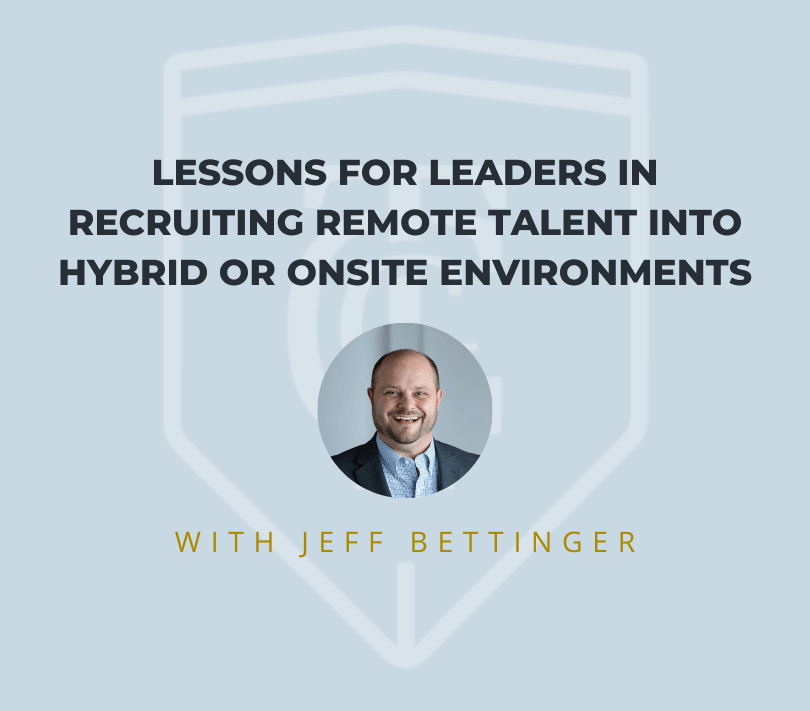
The world of work is evolving rapidly, and leaders are faced with a new challenge: recruiting talent from remote work environments into hybrid or fully onsite setups. This transition demands thoughtful strategies and a keen understanding of the changing dynamics in the job market. We’ll explore the crucial lessons leaders need to learn when recruiting remote talent into different work models. We’ll draw insights from a prominent HR and consulting think tank and reference key data to guide your recruitment journey.
Lesson 1: Adapt Your Hiring Process
One of the first lessons for leaders is to adapt their hiring processes to accommodate remote candidates. According to the McKinsey Global Institute, remote job postings have increased significantly, with some industries seeing up to a 700% rise. To attract top remote talent, leaders should streamline their remote hiring process, using video interviews and virtual assessments to gauge skills and cultural fit.
A report from Glassdoor also highlights the importance of clear communication during the remote hiring process. Provide candidates with a realistic view of your hybrid or onsite expectations, emphasizing how their role fits into the broader organization’s goals.
Lesson 2: Prioritize Inclusivity
As remote work opens up opportunities for global talent acquisition, leaders must prioritize inclusivity. Harvard Business Review’s research shows that diverse teams outperform homogenous ones. To ensure diversity in your talent pool, focus on inclusivity in your remote recruitment efforts.
A recent survey by Deloitte underscores the significance of creating an inclusive environment for remote and hybrid workers. Leaders should actively promote a culture of belonging, provide resources for remote employees, and offer equal career development opportunities.
Lesson 3: Assess Digital Fluency
Digital fluency is another crucial consideration. Remote workers need to be proficient in using digital tools for collaboration and communication. A think tank like the Society for Human Resource Management (SHRM) suggests incorporating digital fluency assessments into your hiring process.
LinkedIn’s Workforce Confidence Index reveals that digital skills are increasingly valued by employers. Leaders should look for candidates with a track record of adapting to digital work environments, as they will be more likely to succeed in hybrid or onsite roles that rely on technology.
Lesson 4: Foster a Sense of Belonging
One of the challenges of transitioning remote talent to hybrid or onsite work is ensuring they feel a sense of belonging. A report by Gallup states that employees who feel connected to their teams and organizations are more engaged and productive.
Leaders should invest in team-building activities, both in-person and virtual, to foster relationships among remote and onsite employees. Encourage cross-functional collaboration and create a shared organizational culture that transcends physical boundaries.
Lesson 5: Provide Flexible Options
Flexibility is key when integrating remote talent into new work models. The World Economic Forum’s Future of Jobs Report predicts an increased demand for roles that allow for flexible work arrangements.
Leaders should offer flexible working options, allowing employees to choose the setup that suits them best. A hybrid model that combines onsite and remote work can provide the flexibility needed to attract and retain top talent.
Lesson 6: Offer Upskilling Opportunities
Investing in upskilling and professional development is essential for talent retention. A report by PwC reveals that 77% of employees believe upskilling is important for career growth.
Leaders should provide opportunities for remote and onsite employees to enhance their skills and stay competitive. Partnering with online learning platforms or offering in-house training programs can help bridge skill gaps and keep employees engaged.
Recruiting remote talent into hybrid or onsite environments presents both opportunities and challenges for leaders. Adapting the hiring process, prioritizing inclusivity, assessing digital fluency, fostering a sense of belonging, providing flexibility, and offering upskilling opportunities are essential lessons to navigate this transition successfully.
As you embark on this recruitment journey, consider these key data points: The McKinsey Global Institute reports a significant increase in remote job postings, with some industries seeing up to a 700% rise. Additionally, a recent survey by Deloitte underscores the importance of creating an inclusive environment for remote and hybrid workers, as it can lead to higher engagement and productivity.
With these lessons and data-driven insights in mind, you can attract and retain top talent, regardless of where they choose to work, and position your organization for success in the evolving world of work.
About Jeff Bettinger
 Jeff joined The Christopher group in 2023 as President, Consulting Advisory & Interim Solutions. Jeff has been the Principal of Six Summit Leadership and previously helpmyresume.com for 15 years before joining TCG. He has coached hundreds of executives and leaders throughout their careers. In addition, Jeff has been a Chief Human Resource Officer for 2 publicly traded companies. His experience spans multiple industries. He has led and supported established and high-growth start-up companies. He has worked with private equity, privately held, and publicly traded companies. Learn more about Jeff by visiting his bio page.
Jeff joined The Christopher group in 2023 as President, Consulting Advisory & Interim Solutions. Jeff has been the Principal of Six Summit Leadership and previously helpmyresume.com for 15 years before joining TCG. He has coached hundreds of executives and leaders throughout their careers. In addition, Jeff has been a Chief Human Resource Officer for 2 publicly traded companies. His experience spans multiple industries. He has led and supported established and high-growth start-up companies. He has worked with private equity, privately held, and publicly traded companies. Learn more about Jeff by visiting his bio page.

